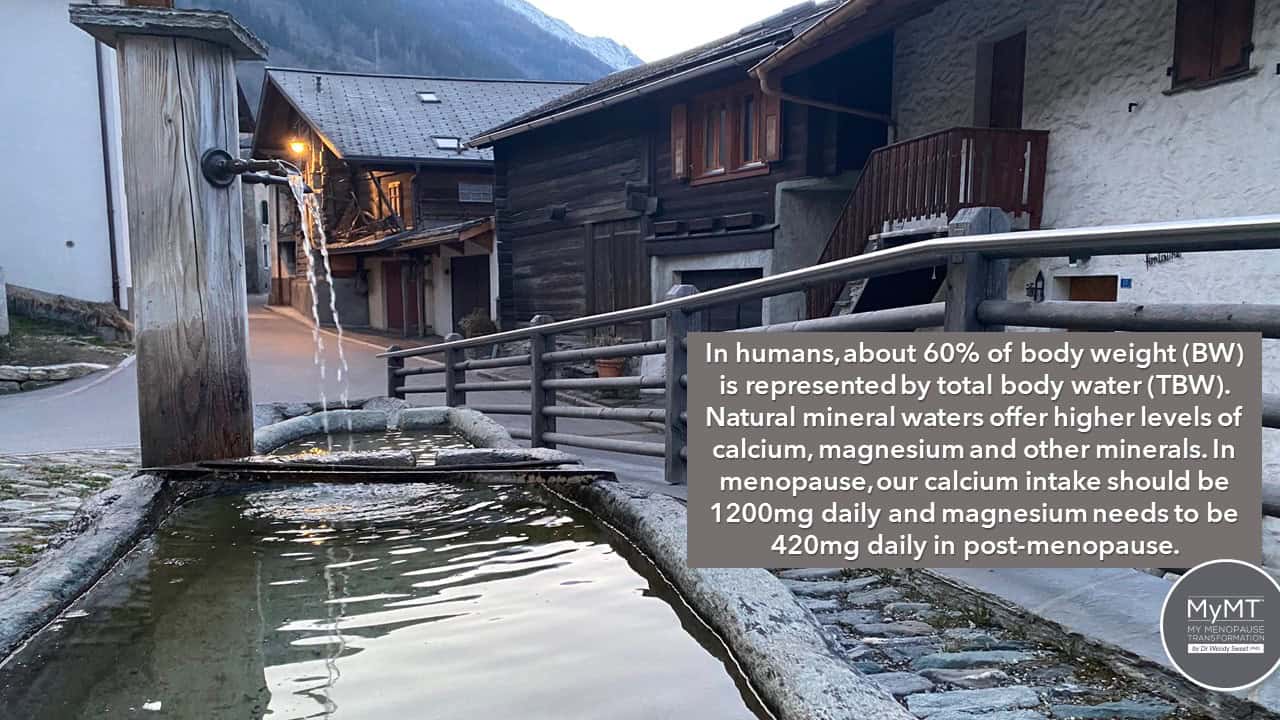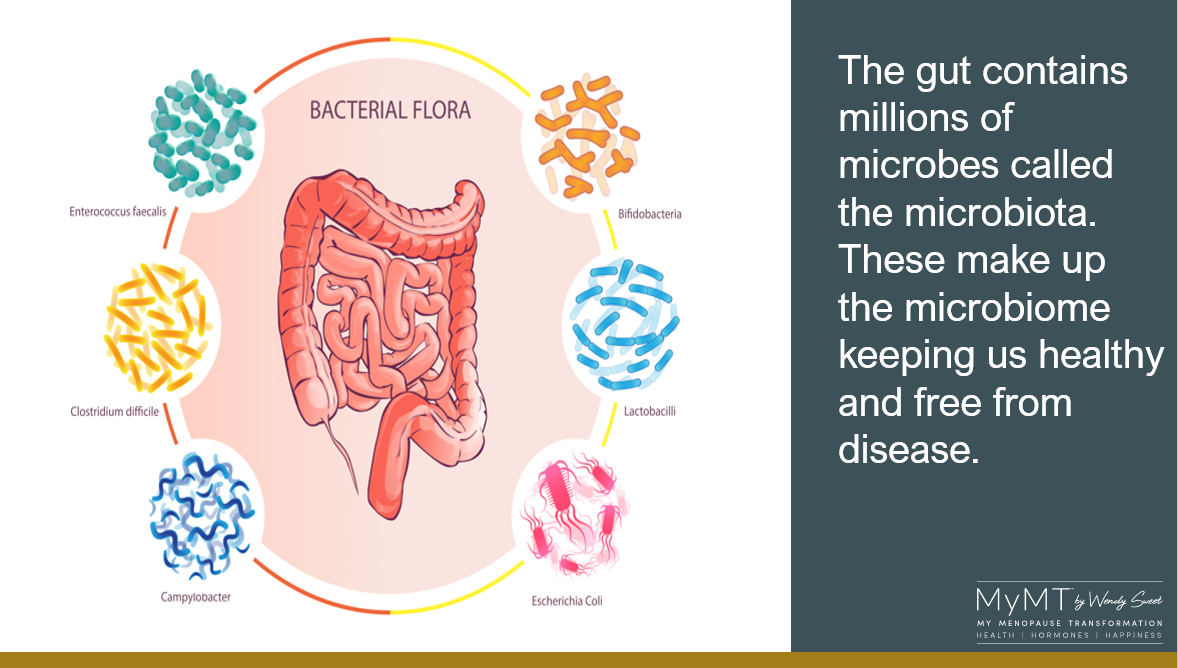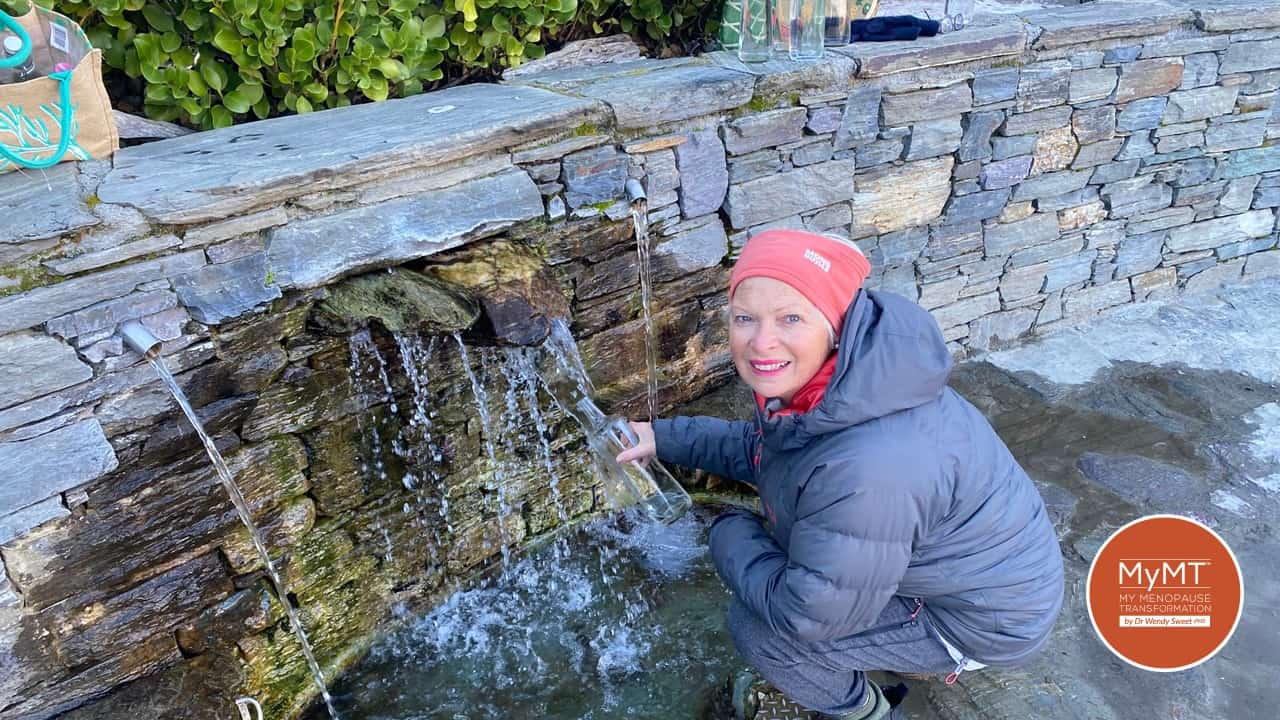When you walk around the lake-front of the small town where I live, there is a natural spring.
I became interested in it when I went into menopause. Not because of its aesthetic value, but because it reminded me of the small mountain village in Switzerland, which is home to a source of glacial water that runs down off the towering mountains above and into the troughs in the village.
In previous visits to this alpine village, I thought that the troughs were for animals, but they aren’t. The locals drink this water and according to the World Health Organisation, this village has pristine water that is ranked high in it’s calcium and magnesium content.
Yes indeed, 1 litre of this water delivers around 520mg of calcium per litre. That’s half of our total calcium intake of 1200mg per day. Drink 2 litres daily and there is your calcium intake done and dusted without a calcium supplement in sight.
With new research arriving to me over the past week, I’ve been reminded of the incredible healing effects of both the natural alpine water in Switzerland and the local spring where I fill my water bottles each week.
This reminder isn’t just because of the minerals these sources of water elicit, but because of the incredible benefits that drinking this water might be achieving for my changing gut health.

As the UK and Europe have been experiencing unprecedented heat waves over the past week and down here in the South of New Zealand it is extremely cold, water intake has been on my mind. Whilst we all know that we should be drinking enough water to remain cool (around 2L daily), did you know that the type and quality of water also affects the gut microbiome too?
No, nor did I.
Effects of Water Intake on Gut Microbiome:
The effect of drinking water on the gut microbiome is poorly understood mentions a new study just released this week (Vanhaecke, Britten et al, 2022). The authors were exploring the associations of plain drinking water source and intake with gut and oral microbiota compositions in a population-based cohort.
Factors such as lifestyle and diet are now widely recognized as key drivers of gut and oral microbiome compositions, so it was interesting that this new study was one of the first times that water quality, amount and type had been positioned in gut health research and microbiota composition.
The researchers set out to explore the relations of plain drinking water source and intake with the composition of the gut and oral microbiota in a large cohort of self-selected participants, some from the US Gut Health Project and others from the United Kingdom.
Water is the main component of the body and represents approximately 76% of muscle mass, so for women entering menopause and for those of you in post-menopause, our water intake and quality matters to our health and our symptoms.
We all know that drinking water comes from various origins – albeit these days, primarily via plastic bottles or boxes purchased at the supermarket! But what type of water (tap-water, well-water, filtered water or bottled water) is best for our gut microbiota? This is what this study attempted to explore.
Tap water is obviously subjected to different treatments before its consumption. Whereas natural mineral water, spring water, and well water, such as in the village where I live and in the Swiss mountain village where I visit occasionally, comes from groundwater, tap water originates either from surface water or from groundwater, but undergoes various treatments depending on government and community requirements and regulations. Common treatments control the chemical and mineral composition in tap water.
As the authors mentioned, “consumed in large amounts on a daily basis, drinking water may be considered a potential source of microbial gut diversity” (p. 172). For women going into and through menopause, their gut diversity matters.
Whilst I’ve talked about this in other articles such as this one HERE, this is just a reminder that the health of our gut influences sleep, temperature regulation, brain fog, anxiety and depression. All symptoms which frustrate numerous women during their menopause transition.

Whilst this new research focused on both men and women, 56% of subjects who qualified for the study were mid-life women.
That’s what piqued my interest in it as well as the fact that this study was perhaps the first to specifically explore the links between drinking water consumption, in terms of both origin and amount consumed, and the microbiota of the digestive tract independently of a wide range of confounding factors (demographics, lifestyle, and diet) in a large sample of the general population.
So, what did the study find?
- Drinking water source was among the major contributing factors to the variation in gut microbiota composition.
- Subjects drinking mostly well water had higher faecal microbiota and diversity than the groups drinking either bottled, tap, or filtered water. This higher diversity is beneficial to gut health.
- The amount of water drunk was also associated with differences in gut microbiota composition between participants who consumed low and high amounts of drinking water. Participants who ranked as low water drinkers (less than 1L daily) were found to have poorer gut microbiome diversity.
Lower gut bacterial diversity, has consistently been associated with impaired gut health and lifestyle diseases. When the gut microbial community has greater diversity, the immune system may be more resilient and robust against environmental influences.
Hence, higher diversity appears a hallmark of healthy gut microbiomes and the researchers concluded that yes indeed, where we source our water from and how much we drink may be an important influence on gut health.

Over the past month, numerous women from around the world have joined me in the MyMT™ Transform Me programme as my July sale has been underway.
I’m so grateful that they have, because I want them to discover the powerful strategies that I’ve spent years researching to turn around our health, weight and symptoms in menopause and post-menopause naturally without the need for endless expensive supplements.
With many now having experienced covid and long-covid, it’s important that we all have a focus on our gut health as we age.
A growing body of evidence has implicated the gut microbiome—the trillions of bacteria, fungi, and other microbes that inhabit the digestive tract—in COVID-19 severity. [BMJ, 25/01/2022] This is an important point to note for recovery purposes – your gut health matters!
Whether you are having to face the heat wave this week up there in the Northern Hemisphere, or you live in areas where it’s cold in the Southern Hemisphere where I am, then this is your reminder that in order to help your gut health and therefore, your menopause symptoms, one of your goals is to drink water – and according to this research, preferably water sourced underground from a well.
When you have time, have a listen to my video below as to how my 12 week coaching programmes work, or jump on the website to take the MyMT™ Symptoms Quiz or read about my 2 hr Masterclass on Menopause (and yes, you can ‘pause’ me anytime).
Dr Wendy Sweet (PhD)/ MyMT™ Founder/ Member: Australasian Society of Lifestyle Medicine.
References:
Vanhaecke, T., Bretin, O., Poirel, M. & Tap, J. (2022). Drinking Water Source and Intake Are Associated with Distinct Gut Microbiota Signatures in US and UK Populations, The Journal of Nutrition, Volume 152, Issue 1, January 2022, Pages 171–182.

